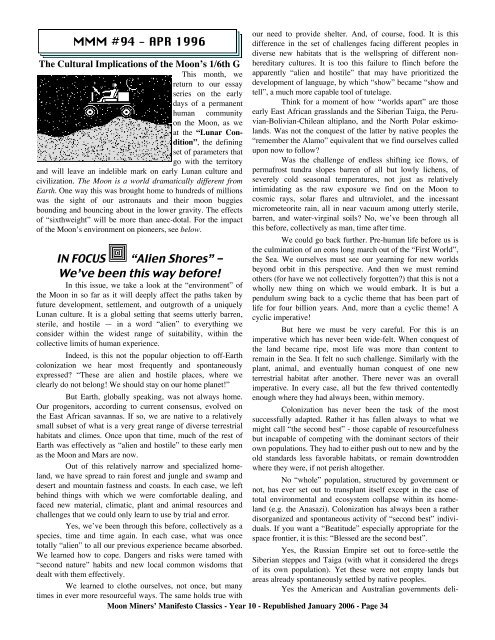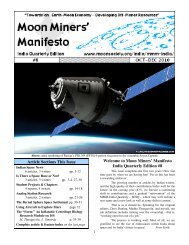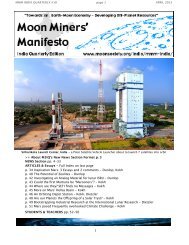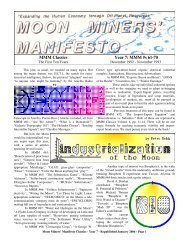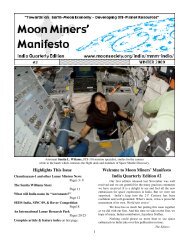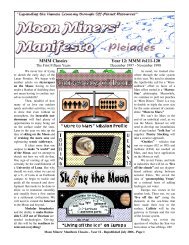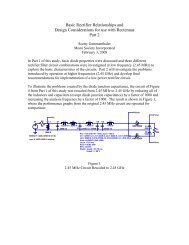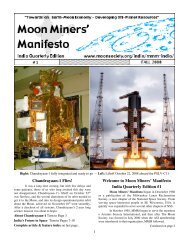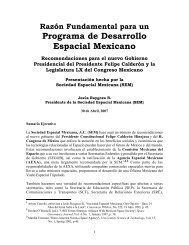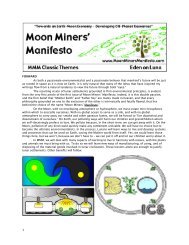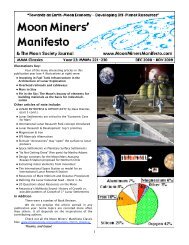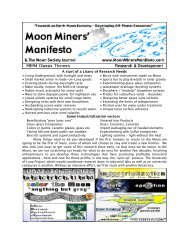MMM Classics Year 10: MMM #s 91-100 - Moon Society
MMM Classics Year 10: MMM #s 91-100 - Moon Society
MMM Classics Year 10: MMM #s 91-100 - Moon Society
You also want an ePaper? Increase the reach of your titles
YUMPU automatically turns print PDFs into web optimized ePapers that Google loves.
<strong>MMM</strong> #94 - APR 1996<br />
The Cultural Implications of the <strong>Moon</strong>’s 1/6th G<br />
This month, we<br />
return to our essay<br />
series on the early<br />
days of a permanent<br />
human community<br />
on the <strong>Moon</strong>, as we<br />
at the “Lunar Condition”,<br />
the defining<br />
set of parameters that<br />
go with the territory<br />
and will leave an indelible mark on early Lunan culture and<br />
civilization. The <strong>Moon</strong> is a world dramatically different from<br />
Earth. One way this was brought home to hundreds of millions<br />
was the sight of our astronauts and their moon buggies<br />
bounding and bouncing about in the lower gravity. The effects<br />
of “sixthweight” will be more than anec-dotal. For the impact<br />
of the <strong>Moon</strong>’s environment on pioneers, see below.<br />
IN FOCUS “Alien Shores” -<br />
We’ve been this way before!<br />
In this issue, we take a look at the “environment” of<br />
the <strong>Moon</strong> in so far as it will deeply affect the paths taken by<br />
future development, settlement, and outgrowth of a uniquely<br />
Lunan culture. It is a global setting that seems utterly barren,<br />
sterile, and hostile — in a word “alien” to everything we<br />
consider within the widest range of suitability, within the<br />
collective limits of human experience.<br />
Indeed, is this not the popular objection to off-Earth<br />
colonization we hear most frequently and spontaneously<br />
expressed? “These are alien and hostile places, where we<br />
clearly do not belong! We should stay on our home planet!”<br />
But Earth, globally speaking, was not always home.<br />
Our progenitors, according to current consensus, evolved on<br />
the East African savannas. If so, we are native to a relatively<br />
small subset of what is a very great range of diverse terrestrial<br />
habitats and climes. Once upon that time, much of the rest of<br />
Earth was effectively as “alien and hostile” to these early men<br />
as the <strong>Moon</strong> and Mars are now.<br />
Out of this relatively narrow and specialized homeland,<br />
we have spread to rain forest and jungle and swamp and<br />
desert and mountain fastness and coasts. In each case, we left<br />
behind things with which we were comfortable dealing, and<br />
faced new material, climatic, plant and animal resources and<br />
challenges that we could only learn to use by trial and error.<br />
Yes, we’ve been through this before, collectively as a<br />
species, time and time again. In each case, what was once<br />
totally “alien” to all our previous experience became absorbed.<br />
We learned how to cope. Dangers and risks were tamed with<br />
“second nature” habits and new local common wisdoms that<br />
dealt with them effectively.<br />
We learned to clothe ourselves, not once, but many<br />
times in ever more resourceful ways. The same holds true with<br />
our need to provide shelter. And, of course, food. It is this<br />
difference in the set of challenges facing different peoples in<br />
diverse new habitats that is the wellspring of different nonhereditary<br />
cultures. It is too this failure to flinch before the<br />
apparently “alien and hostile” that may have prioritized the<br />
development of language, by which “show” became “show and<br />
tell”, a much more capable tool of tutelage.<br />
Think for a moment of how “worlds apart” are those<br />
early East African grasslands and the Siberian Taiga, the Peruvian-Bolivian-Chilean<br />
altiplano, and the North Polar eskimolands.<br />
Was not the conquest of the latter by native peoples the<br />
“remember the Alamo” equivalent that we find ourselves called<br />
upon now to follow?<br />
Was the challenge of endless shifting ice flows, of<br />
permafrost tundra slopes barren of all but lowly lichens, of<br />
severely cold seasonal temperatures, not just as relatively<br />
intimidating as the raw exposure we find on the <strong>Moon</strong> to<br />
cosmic rays, solar flares and ultraviolet, and the incessant<br />
micrometeorite rain, all in near vacuum among utterly sterile,<br />
barren, and water-virginal soils? No, we’ve been through all<br />
this before, collectively as man, time after time.<br />
We could go back further. Pre-human life before us is<br />
the culmination of an eons long march out of the “First World”,<br />
the Sea. We ourselves must see our yearning for new worlds<br />
beyond orbit in this perspective. And then we must remind<br />
others (for have we not collectively forgotten?) that this is not a<br />
wholly new thing on which we would embark. It is but a<br />
pendulum swing back to a cyclic theme that has been part of<br />
life for four billion years. And, more than a cyclic theme! A<br />
cyclic imperative!<br />
But here we must be very careful. For this is an<br />
imperative which has never been wide-felt. When conquest of<br />
the land became ripe, most life was more than content to<br />
remain in the Sea. It felt no such challenge. Similarly with the<br />
plant, animal, and eventually human conquest of one new<br />
terrestrial habitat after another. There never was an overall<br />
imperative. In every case, all but the few thrived contentedly<br />
enough where they had always been, within memory.<br />
Colonization has never been the task of the most<br />
successfully adapted. Rather it has fallen always to what we<br />
might call “the second best” - those capable of resourcefulness<br />
but incapable of competing with the dominant sectors of their<br />
own populations. They had to either push out to new and by the<br />
old standards less favorable habitats, or remain downtrodden<br />
where they were, if not perish altogether.<br />
No “whole” population, structured by government or<br />
not, has ever set out to transplant itself except in the case of<br />
total environmental and ecosystem collapse within its homeland<br />
(e.g. the Anasazi). Colonization has always been a rather<br />
disorganized and spontaneous activity of “second best” individuals.<br />
If you want a “Beatitude” especially appropriate for the<br />
space frontier, it is this: “Blessed are the second best”.<br />
Yes, the Russian Empire set out to force-settle the<br />
Siberian steppes and Taiga (with what it considered the dregs<br />
of its own population). Yet these were not empty lands but<br />
areas already spontaneously settled by native peoples.<br />
Yes the American and Australian governments deli-<br />
<strong>Moon</strong> Miners’ Manifesto <strong>Classics</strong> - <strong>Year</strong> <strong>10</strong> - Republished January 2006 - Page 34


